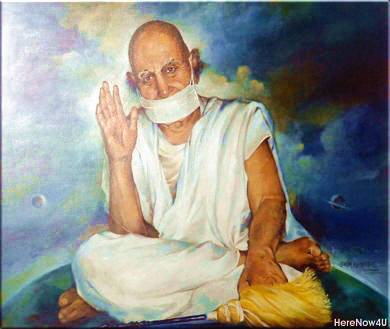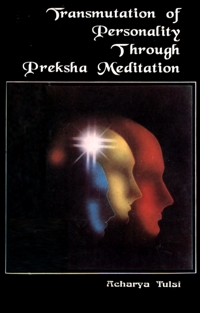
In this vulnerable world, there is nothing stable!
Who can say he's going to last for ever,
Time swallows everything, moving and unmoving,
Wittingly or no, it befools all men!
As a particle of water on a blade of grass is life,
Like a water-bubble is the present moment!
A man's youth is so very restless and wavering!
How can he ever find the meaning of life?
Not only man, even paradise mortal is.
There-'s not to be found there a trace of absolute joy!
Is there a thing in the entire creation
Which remains the same for ever and ever?
The playmates with whom one frolicked in childhood,
To whom one remains so attached for ever!
All those near and dear ones departed!
Who can prevent our passing away?
Waves emerge from the restless ocean,
To slide again into its embrace!
How illusory is the union of kith and kin!
How can this overpower a sadhak true?
All is transient here, nothing lasts for ever;
"'Born to die" is the Universal Way!
The sadhak who comprehends this Law!
Is sure set on the path of salvation!
Anupreksha is related to argument, ideas and thinking. Is this thinking about any material or immaterial object, or does it have any definite basis? If so, will you kindly talk about it in detail?
The context and connotation in which the word,anupreksha has been used, is a pure spiritual element. From the verbal point of view canalised thinking about any object may be called anupreksha, but that is not the intention here. Therefore, it would be pertinent here to talk about the grounds of anupreksha. The first ground is the transience of life.
In this world, there are two kinds of elements - lasting and transitory. To treat the eternal as transient, and the transient as eternal, only serves to strengthen illusion. The pleasure of identification with an object or the pain of separation from it is illusory, not real. As long as the network of illusion lasts, listening to or reading a thousand discourses leads to no real understanding of spirituality. Illusion, indeed, is our greatest problem. The most important method of breaking it is the contemplation of what is transitory. As the transience of matter is gradually driven home, the network of illusion disintegrates. Only then does one fully grasp the secret of the transience of the world.
This world, which forms the basis of our joy, is this transitory, too? What is its real nature?
The world offers no protection. It is mortal. Everything here is transient. All attempts to make it stable are destined to fail because the cycle of time destroys everything.
Human life in this world is considered to be the most important, but everybody knows how transient it is. Imagine the existence of a particle of water on a blade of grass! Human life is no less uncertain than that. A man is proud of his life, youth, and property. He is caught in an illusion. All that he prides in is unsubstantial. Without first dissolving this illusion, the true significance of human life remains hidden from view.
What to talk of man - even paradise, which is looked upon as eternal, is mortal, not free from death. Even the immortals are destined to leave their heaven and shift to a different world. Even the pleasures of heaven, which man is so eager to attain, are not absolute. Even these come to an end. What happiness can a man imagine which would last all through his life? Everything that comes into existence finally ceases to be. That is the ultimate destiny. It is universally acknowledged that everything in this world is transitory. If so, how can one find eternal joy through what is transient?
Which path should a seeker after Truth adopt, so that he can directly experience eternity and be free from illusion?
The realisation of transience and the direct experiencing of its reality, pushes a man in the direction of the eternal. The living form of transience is before us all. The people man lives with, in whose company he spends his childhood and youth and with whom he plays and whose joys and sorrows he shares, all who ever loved one are ultimately burnt to ashes. Here one is face to face with the challenge of transitoriness. Waves arise in the ocean and subside. Similarly, in the world, things come into being and disappear. In such a state, if there is a steady companion for man, it is his own consciousness. Except his own consciousness, nothing else can give a man constant company.
In order to come face to face with the eternal, the simplest way is the contemplation of transience. Union and separation are inevitably interlinked. The man, whose mind is permeated by this reflection, succeeds in breaking out of the circle of illusion. Only the sadhak who comprehends transience can pierce the veil of delusion and do obeisance at the altar of awakening.
Every sensible person knows that the world is mortal, that all worldly pleasure is fleeting, all union transitory and the individual himself lasts for a short time, and yet he is not able to come out of the illusion about the world, about pleasure, about one's kin and about himself. Why?
Mere theoretical knowledge serves little purpose. Many people know many things, but do they achieve their goal? The way to realise anything is through constant practice. Eklavaya's constant practice turned him into an eminent archer. Whether it is the path of art or of sadhana, without practice nothing is achieved.
Lord Mahavir was a self-realised soul from birth. Still before renouncing home, he practised a life of austerity and penance for two years. Why? He had been called upon to be a witness to his own sadhana. During this two-year sadhana, great valour sprouted forth from every part of his body.
Here was the ground of daily conduct, no mere intellectual play. Standing on that ground, Lord Mahavir was engrossed in contemplation of transitoriness for six months. He was so much permeated by this anupreksha of transience that the song of transience burst forth from every pore of his being. In those moments, he grew so highly sensitive and throbbing with energy that a whole current of transience with its tremendous vigour coursed out of his life, leaving behind the illumination of eternal consciousness. In order to assimilate that transcendental light, Mahavir started on a pilgrimage and kept going until he became an embodiment of light himself.
Prolonged anupreksha is a must for strengthening one's comprehension of the transience of the world. The minimum duration thereof is three months. Without practising anupreksha for three to six months, no worthwhile result is possible. Gurdjieff selected 32 sadhaks and kept them in a room. They were made to practise monistic anupreksha. When they ventured out of the room after three months, they found the whole world transformed. Even in the midst of a crowd, they experienced a sense of solitariness. This experience changed the entire course of their life. Such an experience comes about only through practice. Therefore, in order to taste or assimilate any truth, one must always remember to practise anupreksha.
 Acharya Tulsi
Acharya Tulsi
